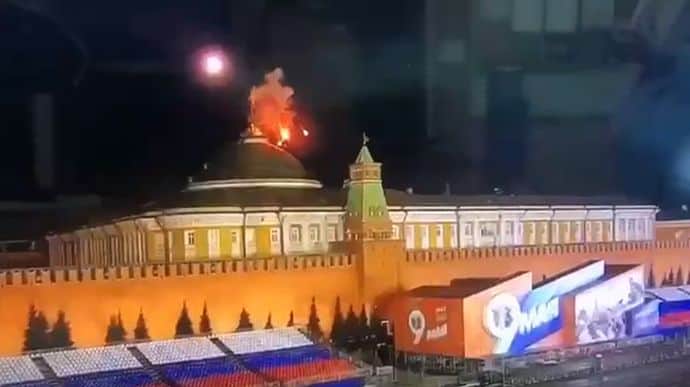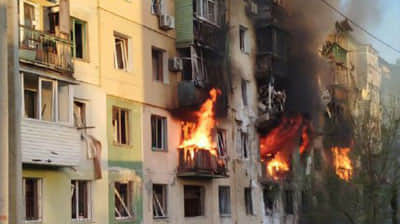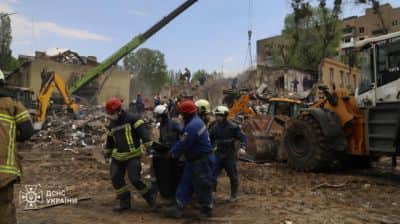UAV attacks and border breaches are Ukrainian "shaping operations" – FT

The UK's Financial Times writes that Ukraine has been conducting "shaping operations" to mislead or distract Russian commanders and create a favourable backdrop for a counter-offensive.
Source: Financial Times
Quote from FT: "First there was a mysterious drone strike on the Kremlin. Next came an "invasion" whose embarrassing implications for Moscow could prompt it to divert front-line troops to border regions. Then, late last week, Ukraine launched a marine drone attack on a Russian spy ship in the Black Sea. On Tuesday morning, as many as two dozen aerial drones attacked Moscow.
Ahead of Kyiv’s long-expected counter-offensive, when it aims to retake occupied territory, such attacks are just four of the increasingly daring "shaping operations" that Ukraine has launched this month.
Ranging from symbolic strikes to more strategically significant attacks, these shaping operations form part of standard military practice. Their aim, defence officials and analysts say, is to deceive the enemy, meddle with its mindset and otherwise "shape" the battlefield before a large offensive."
Details: The news agency mentions the explosion of two drones over the Kremlin dome on 3 May and the morning UAV attack on Moscow on 30 May, which revealed the vulnerability of the Russian capital. Furthermore, the break-in by two groups of far-right Russian partisans on the Russian border in Belgorod Oblast on 22 May indicated that Russia's borders are "not impenetrable".
"A successful offensive starts with a successful psychological offensive. Their [Russian] morale is not at its highest level," a senior Ukrainian official said.
Mike Martin, a former UK army officer and author of the book How to Fight a War, says: "The idea is to create a lot of dilemmas for the Russian command structure. Problems — such as a breakthrough of the front line — focus attention. Dilemmas, by contrast, paralyse action".
John Spencer, a former US Army major in charge of urban warfare studies at the West Point Modern War Institute, notes that "deception operations" have always been part of warfare, but now their effect is amplified by social media.
"They are Ukrainian grey zone operations that require Russia to expend resources — be that troops or information operations. They’re like a magician’s sleight of hand: they deceive the viewer and force his attention elsewhere," Spencer said.
The FT notes that the shaping operations have had a certain psychological effect in Moscow and have been commented on in the Kremlin and the blogging community.
A Ukrainian military intelligence official said that the raid in Belgorod Oblast and similar operations are intended to "deliver a blow to [Russian] morale and force them to redeploy troops" along the border, although "we have not yet seen any indication" of this.
As Spencer puts it, "Ukraine is using the Russian playbook against Russia". Moscow was promoting the scenario of an offensive from the territory of Belarus, forcing Ukraine to deploy troops nearby. However, "the Ukrainians are now similarly distracting Russian attention".
The FT points out that Ukraine effectively used a similar tactic last summer, as it had discussed the idea of a counter-offensive in the south for several weeks, and when Russian troops moved there, Kyiv launched a blitzkrieg in the country’s north Kharkiv Oblast.
Western officials say it’s unclear how effective the upcoming counteroffensive will be but that Ukraine will continue its "shaping operations", combining them with precision attacks aimed at undermining Russian military assets and capacity.
These may include long-range strikes using Storm Shadow cruise missiles as well as drone attacks on "fat targets" such as the Ivan Khurs reconnaissance ship.
"They [the Ukrainians] are testing and probing and finding out what works and what doesn’t," said a senior Western official.
"The whole point of this counter-offensive is that neither Russia nor the [Western allies] know when it has really begun, and what we’re seeing now is them forcing the Russians to keep second guessing," he believes
From a Ukrainian perspective, this "nervous uncertainty" is key, the FT concludes.
Background: The Ukrainian authorities deny any involvement in the UAV attack on the Kremlin or in the actions of the Russian Volunteer Corps and the Freedom of Russia Legion in Russia’s Belgorod Oblast.
Journalists fight on their own frontline. Support Ukrainska Pravda or become our patron!





